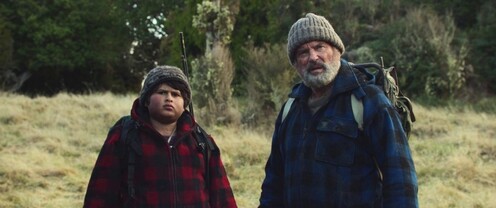A- | A foster kid and his adoptive father hide in the New Zealand forest from child services. Directed by Taika Waititi Starring Julian Dennison, Sam Neill, and Rachel House Review by Jon Kissel |

What might’ve been a happy family is shattered when Bella suddenly dies of natural causes. Hec doesn’t believe himself to be cut out for state-approved parentage and accepts that Ricky’s going to be reassigned, but Ricky knows that there are no more foster homes for a 13-year-old. One last runaway attempt leads to him burning down a shed with a poorly made body double inside. Hec finds Ricky in the forest, but breaks his ankle, forcing the two of them to camp for weeks while his bones heal. Meanwhile, Paula has taken the worst possible interpretation of events back at the farm, and sends all available resources into the forest to find Ricky and Hec and fold them back under her oppressive control. They thwart her for months, hiding out in the forest while their legend builds with increasingly sympathetic news reports.
Waititi fills Ricky's trek with a wacky cast of characters befitting his earlier work in vampire mockumentaries and Flight of the Conchords. Ricky, Hec, Bella, and Paula all move beyond the types they might have been, mostly through Waititi's ability to give them all their own distinct kind of laughs. Paula's overestimation of her mission, Ricky's well-meaning obliviousness, Hec's curt delivery, and Bella's no-filter boisterousness all generate comedy from absurdity and pathos. As the wilderness trek continues, there's no shortage of oddballs, from an inappropriate priest played by Waititi himself to New Zealand staple Rhys Darby as a tweaked mountain man. A brief rest with another rural family provides a peak at what Ricky’s life could be like, and Waititi characterizes this father and daughter as another pair who can generate comedy from their specificity and warmth from their gentleness. Hunt For the Wilderpeople creates these idylls for Ricky and, for all the fun it has, keeps asking why he can’t have this simple and happy life. That emotional resonance bumps Waititi’s film well outside his long-running resistance to earnestness. Not everything has to be a joke. Just most things. B+
 RSS Feed
RSS Feed